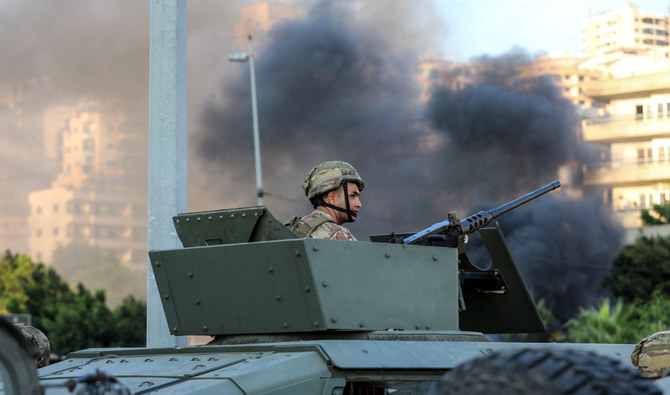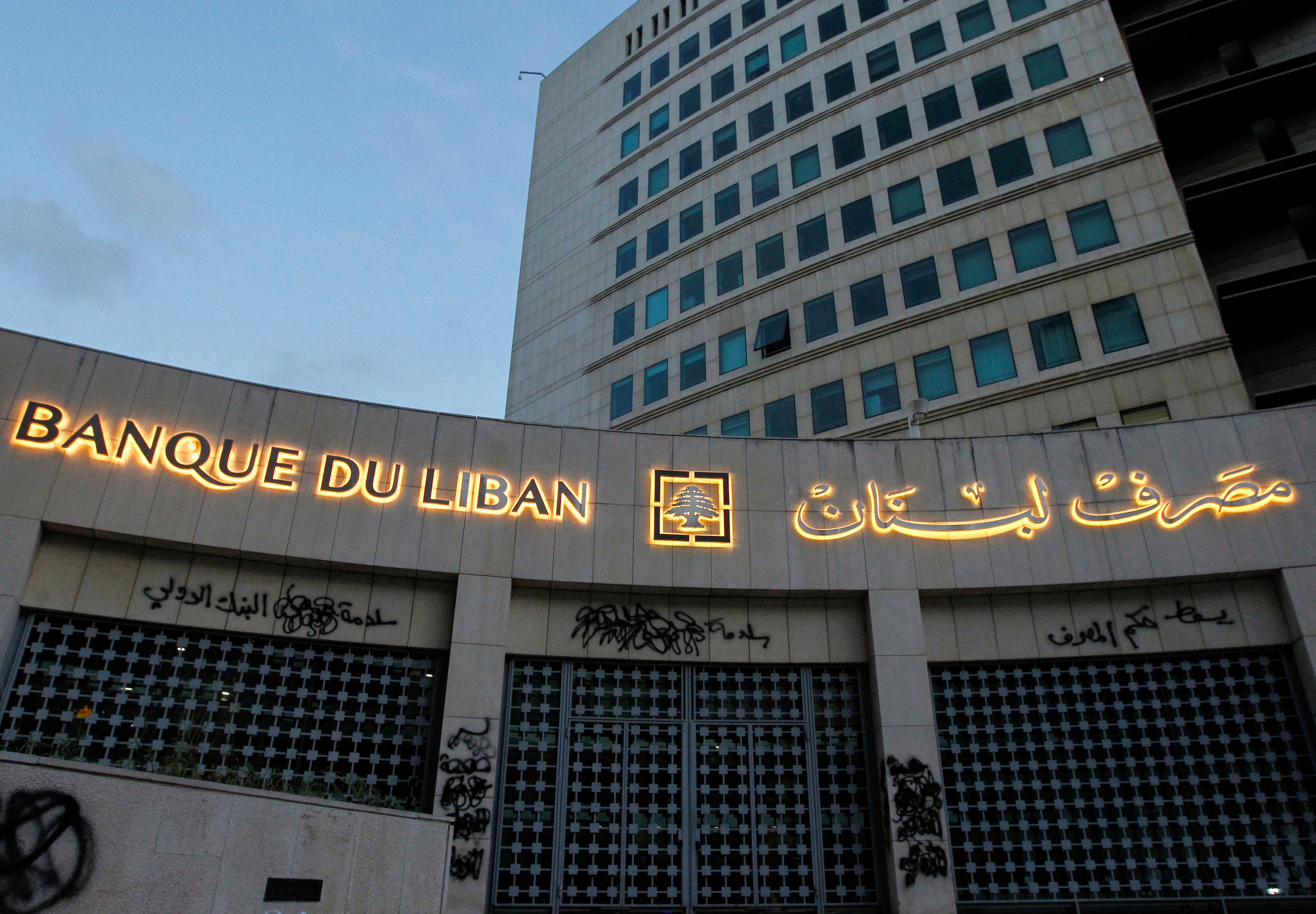
by arabnews.com -- Najia Houssari -- BEIRUT: The Lebanese army has ‘redeployed’ soldiers away from several regions, notably Beirut’s southern suburbs, with its command saying in a statement that the redeployment is intended “to reduce the economic burdens on the army.” The military has been struggling due to Lebanon’s economic meltdown. In his notorious speech in March, Joseph Aoun, commander of the Lebanese Army, said: “Soldiers are struggling like other people; a soldier’s salary has lost its value and soldiers are going hungry like others.” Aoun, who is currently visiting Turkey, met with his Turkish counterpart and other officials on Friday and requested logistical support, including equipment and machinery. He will also visit Washington at the end of September to ask for direct American aid and promises of military assistance for the Lebanese army. In recent months, some soldiers have deserted as the depreciation of the Lebanese pound has seen the relative value of their salaries plummet to the equivalent of $60 per month. Army command claims the number of deserters is “limited.”
Residents of the Lebanese capital’s southern suburbs were surprised when the army withdrew its forces from checkpoints in the area. Soldiers have been deployed there since 2013, when the suburbs were targeted by bombings that were blamed on Daesh, and seen as connected to the war in Syria and Hezbollah’s interference in the interests of Syrian President Bashar Assad’s regime. Lebanese army command stressed on Friday that its troops would “continue to set up observation points in all areas, work on patrols, and carry out security missions.” Meanwhile, dozens of families of victims of the August 2020 explosion in Beirut Port gathered in the capital to protest against the political pressure being placed on Judge Tarek Bitar, who is leading the investigation into the blast. Bitar was recently threatened by Hezbollah and, on Friday, the attorney representing Nohad Machnouk, the former interior minister who is accused in the case, filed a request to dismiss Bitar from the investigation. If Bitar were to be dismissed from the case, he would be the second judge to have been removed from the investigation. Like his predecessor, Judge Fadi Sawan, Bitar has issued a subpoena for a former prime minister, ministers and security officials in connection with the explosion..
BEIRUT (AP) Zena Karam — The reverberations of terrorism across the oceans and war in their own neighborhood have left Lebanon and its fellow nations in the Middle East struggling with the consequences, Lebanon’s president said Friday, calling for international help to save his own crisis-hit country. With Lebanon mired in an unprecedented economic and financial meltdown, President Michel Aoun told the U.N. General Assembly's meeting of world leaders that the country could not rise without assistance from the global community. Lebanon is in the grips of multiple crises that exploded in succession beginning in late 2019, largely caused by decades of corruption and mismanagement by the country's ruling class. A currency crash has plunged about three quarters of the population into poverty in the past year and triggered a brain drain not seen since its 1975-90 civil war days. That has been accelerated by the coronavirus pandemic and a massive explosion at the port of Beirut in August 2020 that killed more than 200 people and destroyed parts of the city. Hundreds of thousands of refugees from neighboring Syria have put an additional strain on the tiny Mediterranean country.
The international community has refused to offer financial assistance before Lebanese leaders undertake critical reforms and stamp out endemic corruption. Aoun described the recent formation of a new government in Lebanon after more than a year of political paralysis a “promising step on the road to recovery,” and appealed for the world’s help. “We now look to the international community to finance vital projects in the public and private sectors in order to revive the economy and create job opportunities,” he said. Aoun also said Lebanon welcomes any international effort to rehabilitate and develop Beirut's port following the catastrophic Aug. 4. 2020 explosion. The blast happened when a fire ignited hundreds of tons of ammonium nitrates that had been haphazardly stored for years at a port warehouse.

by AFP -- After repeating previous criticism of Lebanon's political class, Macron told Mikati it was "urgent to implement measures and essential reforms" and that Lebanon "could count on" former colonial power France for support. The reforms should include tackling power and other infrastructure problems, improving public finances, reducing corruption, and stabilising the banking system, he said. Mikati said he had come to the French capital to reassure Macron that he and his new government, approved by the Lebanese parliament on Monday, were committed to reforming. "I expressed my determination to implement ... the necessary reforms as soon as possible in order to restore confidence, to give hope and reduce the suffering of the Lebanese population," he said. He also vowed to respect the country's political timetable and hold general elections next year.
The billionaire's nomination has brought an end to 13 months of political deadlock since an August 2020 blast that killed at least 214 people and devastated swathes of the capital Beirut. An economic meltdown since then has depleted central bank reserves, devalued the currency by more than 90 percent and plunged three out of four citizens below the poverty line, while those who can are emigrating by the thousands. France has led the international response to the tragedy, organising three international conferences devoted to Lebanon and delivering aid in exchange for promises of political reform and accountability. Macron travelled to Lebanon two days after the blast, and returned for a second trip.

DUBAI, (Reuters) - Lebanon bond investors could see their holdings slashed by 75%, Goldman Sachs said, should the newly formed government solve losses in the financial system, embark on credible reforms and unlock funding from the International Monetary Fund. Lebanon defaulted on its international debt in March 2020, after years of political upheaval and economic mismanagement left it unable to service a debt burden that Goldman Sachs estimated at over 300% of GDP at current market exchange rates. After a year of political deadlock, a new government was formed this month under Sunni Muslim tycoon Najib Mikati, with three-quarters of the population now in poverty after one of the deepest depressions of modern history. "The ratification by parliament of the Mikati government on Monday represents the first step on a long and narrow path to Lebanese economic recovery that is likely to be fraught with difficulty and risk", Goldman said in a report this week.
The bank's debt recovery projections are based on assumptions including a strengthening of the Lebanese pound to 8,000 to the dollar in the medium term from around 14,500 in the parallel market currently, as well as negative or low real interest rates on public debt, and certain levels of economic growth and fiscal balance adjustment. "Given these assumptions and constraints, we arrive at an estimated haircut to the nominal value of the current Eurobonds of 75%", it said. Resolving losses in the financial system will be the government's first challenge, Goldman said, estimating foreign exchange liabilities in the banking sector at $70 billion, against $13 billion in usable reserves at the central bank.
Khazen History


Historical Feature:
Churches and Monasteries of the Khazen family

St. Anthony of Padua Church in Ballouneh
Mar Abda Church in Bakaatit Kanaan
Saint Michael Church in Bkaatouta
Saint Therese Church in Qolayaat
Saint Simeon Stylites (مار سمعان العامودي) Church In Ajaltoun
Virgin Mary Church (سيدة المعونات) in Sheilé
Assumption of Mary Church in Ballouneh
1 - The sword of the Maronite Prince
2 - LES KHAZEN CONSULS DE FRANCE
3 - LES MARONITES & LES KHAZEN
4 - LES MAAN & LES KHAZEN
5 - ORIGINE DE LA FAMILLE
Population Movements to Keserwan - The Khazens and The Maans
ما جاء عن الثورة في المقاطعة الكسروانية
ثورة أهالي كسروان على المشايخ الخوازنة وأسبابها
Origins of the "Prince of Maronite" Title
Growing diversity: the Khazin sheiks and the clergy in the first decades of the 18th century
Historical Members:
Barbar Beik El Khazen [English]
Patriach Toubia Kaiss El Khazen(Biography & Life Part1 Part2) (Arabic)
Patriach Youssef Dargham El Khazen (Cont'd)
Cheikh Bishara Jafal El Khazen
Patriarch Youssef Raji El Khazen
The Martyrs Cheikh Philippe & Cheikh Farid El Khazen
Cheikh Nawfal El Khazen (Consul De France)
Cheikh Hossun El Khazen (Consul De France)
Cheikh Abou-Nawfal El Khazen (Consul De France)
Cheikh Francis Abee Nader & his son Yousef
Cheikh Abou-Kanso El Khazen (Consul De France)
Cheikh Abou Nader El Khazen
Cheikh Chafic El Khazen
Cheikh Keserwan El Khazen
Cheikh Serhal El Khazen [English]
Cheikh Rafiq El Khazen [English]
Cheikh Hanna El Khazen
Cheikha Arzi El Khazen
Marie El Khazen
